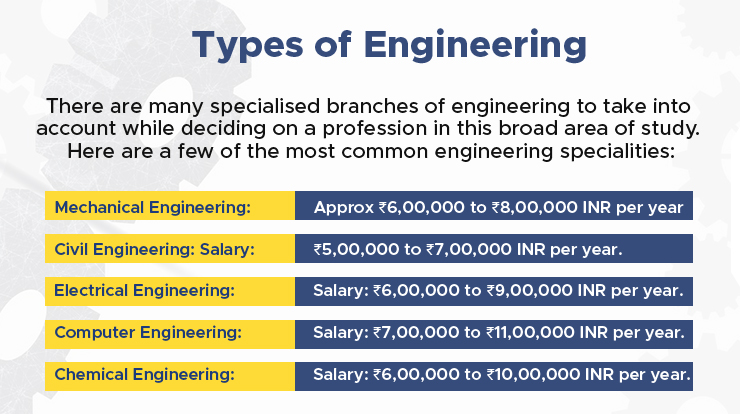When it comes to choosing a career path, one of the key factors many people consider is the potential for higher education to lead to a stable and well-paying job. Engineering is a field that often stands out in this regard, offering a wide range of career options.
In this blog, we will explore different types of engineering, their salary expectations, and job outlooks to help you make an informed decision about your future. So, let’s get started with this.
What is Engineering?
Let’s first understand engineering process so that we can better grasp the various types of engineering. Engineering is the use of mathematical and scientific ideas to design, create, and maintain structures, systems, and products that enhance our daily lives. Engineers handle problems in the real world with creativity and problem-solving abilities.
Types of Engineering
There are many specialised branches of engineering to take into account while deciding on a profession in this broad area of study. Here are a few of the most common engineering specialities:

Mechanical Engineering
The architects of machines are mechanical engineers. They design, research, and create mechanical systems, from simple tools to complex machinery. There are opportunities for mechanical engineers in sectors like manufacturing, aircraft, and automobiles.
Salary: The median annual salary for mechanical engineers in India is approximately ₹6,00,000 to ₹8,00,000 INR per year.
Job Outlook: Mechanical engineers, who are in high demand, are expected to profit from the need for cutting-edge equipment and technology.
Civil Engineering
Buildings, bridges, highways, and water supply systems are all examples of the infrastructure that civil engineers are in charge of constructing and maintaining. They are essential in shaping the physical environment that surrounds us.
Salary: Civil engineers earn a median salary of around ₹5,00,000 to ₹7,00,000 INR per year.
Job Outlook: The demand for civil engineers is expected to grow steadily as infrastructure continues to age and new projects are developed.
Electrical Engineering
Electronics, power generation, communication systems, and other electrical systems and devices are all the work of electrical engineers. They are at the forefront of technical development.
Salary: The median annual salary for electrical engineers in India is approximately ₹6,00,000 to ₹9,00,000 INR.
Job Outlook: The job outlook for electrical engineers is promising, especially in areas like renewable energy and telecommunications.
Computer Engineering
Computer engineers concentrate on creating new software and hardware for computers. They have a significant impact on how the modern digital world is shaped.
Salary: Computer engineers can expect a median annual salary of about ₹7,00,000 to ₹11,00,000 INR.
Job Outlook: With the ever-growing dependence on technology, the demand for computer engineers is expected to remain strong.
Chemical Engineering
Chemical engineers work with chemicals, materials, and processes to develop products ranging from pharmaceuticals to food and beverages. They help in optimising industrial processes.
Salary: The median salary for chemical engineers in India is approximately ₹6,00,000 to ₹10,00,000 INR per year.
Job Outlook: The job outlook for chemical engineers is stable, with opportunities in various industries, including healthcare and manufacturing.
Higher Education in Engineering
To pursue a career in engineering, a higher education is typically required. Most engineering roles demand at least a bachelor’s degree in engineering or a related field. Many engineers choose to pursue master’s or doctoral degrees for more specialised roles or to advance their careers.
Bachelor’s Degree (B.S.)
An engineering bachelor’s degree normally requires four years for completion. It is adequate for entry-level engineering careers and gives a solid foundation in engineering principles.
Master’s Degree (M.S.)
After earning a bachelor’s degree, getting an engineering master’s degree usually requires an extra two years. It enables specialisation in a particular field and could open the way for more senior positions.
Doctoral Degree (Ph.D.)
An engineering PhD is the highest level of education available in this field. The people who are looking to lead R&D activities in businesses or hold academic research and teaching positions normally pursue this.
Salary Expectations and Job Outlook
Your expected salary as an engineer may vary depending on your area of expertise, location, and level of experience. However, engineering is frequently known for paying well. The estimated salaries are broken down by educational level as follows:
- Bachelor’s Degree: Entry-level engineers with a bachelor’s degree can typically expect salaries in the range of ₹4,00,000 to ₹6,00,000 INR per year.
- Master’s Degree: Engineers with a master’s degree tend to earn higher salaries, ranging from ₹6,00,000 to ₹10,00,000 INR annually.
- Doctoral Degree: Those with a Ph.D. in engineering often earn the highest salaries, with some exceeding ₹12,00,000 INR per year.
Conclusion
Higher education can open up a variety of career options in engineering, which can pay well and provide a meaningful work life. Engineering offers something to offer for anybody interested in creating new products, creating cutting-edge technology, or modifying the physical world through infrastructure initiatives.
When selecting a particular engineering discipline, take your interests, strengths, and long-term objectives into account. Also, keep in mind that the world of engineering is full of fascinating opportunities for those who are prepared to seize them.
The great foundation of a successful career always starts with the initial step, college. So, if you are looking for the best university in Rajasthan, go nowhere other than Sangam University. We have a group of the best teachers who can guide you and lead you to the right path. Contact our team now to get admission to the top private university in Rajasthan.
FAQs
FAQ 1: What is the minimum educational requirement to become an engineer in India?
Answer: In India, the minimum educational requirement to become an engineer is a Bachelor’s degree in engineering (B.E. or B.Tech). This is typically a four-year undergraduate program. However, some specialised engineering positions may require
higher degrees, such as a Master’s or Ph.D.
FAQ 2: What factors can influence an engineer’s salary in India?
Answer: Several factors can influence an engineer’s salary in India, including:
- Experience
- Location
- Industry
- Education
- Skills and Specialization
FAQ 3: Is engineering a stable career choice in India?
Answer: Engineering is generally considered a stable career choice in India. The demand for engineers remains strong in various sectors, including manufacturing, technology, infrastructure, and healthcare. Engineers will be in demand as long as technological advancements continue and infrastructure projects are developed.
FAQ 4: Are there gender disparities in engineering salaries in India?
Answer: Unfortunately, gender disparities in engineering salaries still exist in India, with male engineers often earning more than their female counterparts. However, efforts are being made to bridge this gap through initiatives promoting gender diversity and equal pay for equal work.
FAQ 5: How can I stay updated with the latest developments in my engineering field?
Answer: Staying updated in engineering is crucial for career growth. Here are some ways to do it:
- Continuing Education
- Professional Associations
- Attending conferences and seminars
- Online Resources
- Networking

